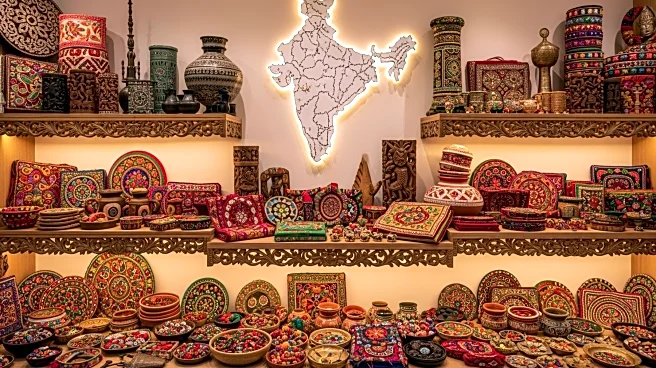What's Happening?
Prime Minister Narendra Modi has reinvigorated the Swadeshi movement in India, a concept rooted in the country's freedom struggle, to counteract aggressive export tariff policies from the United States
under President Trump. At a public rally in Varanasi, Modi emphasized the importance of self-reliance and the 'Vocal for Local' initiative, encouraging citizens to prioritize Indian-made goods. This call to action has resonated with the Indian populace, as evidenced by record sales of Swadeshi goods during Diwali, amounting to Rs 5.40 lakh crore, according to the Confederation of All India Traders. This movement not only aims to bolster India's economic strength but also seeks to reduce dependency on foreign products, particularly from China.
Why It's Important?
The revival of the Swadeshi movement under Modi's leadership is significant as it represents a strategic response to global trade tensions, particularly with the United States. By promoting self-reliance and indigenous production, India aims to strengthen its economic position and reduce vulnerability to international market fluctuations. This shift is expected to benefit local industries, increase employment, and enhance national security by reducing reliance on foreign technology. The movement's success during Diwali indicates a growing consumer preference for domestic products, which could lead to sustained economic growth and a more resilient economy.
What's Next?
The Swadeshi movement is likely to continue gaining momentum, with potential expansions into various sectors, including defense and technology. The Indian government may further incentivize local production and innovation, aiming to position India as a global superpower. As consumer confidence in Indian products grows, the demand for foreign goods, particularly from China, may continue to decline. This trend could lead to increased investment in domestic industries and further policy measures to support self-reliance.
Beyond the Headlines
The Swadeshi movement's resurgence highlights a cultural shift towards national pride and self-sufficiency. It underscores the importance of economic independence in the face of global uncertainties and trade disputes. The movement also raises questions about the balance between globalization and national interests, as India navigates its role in the international market while prioritizing domestic growth.











